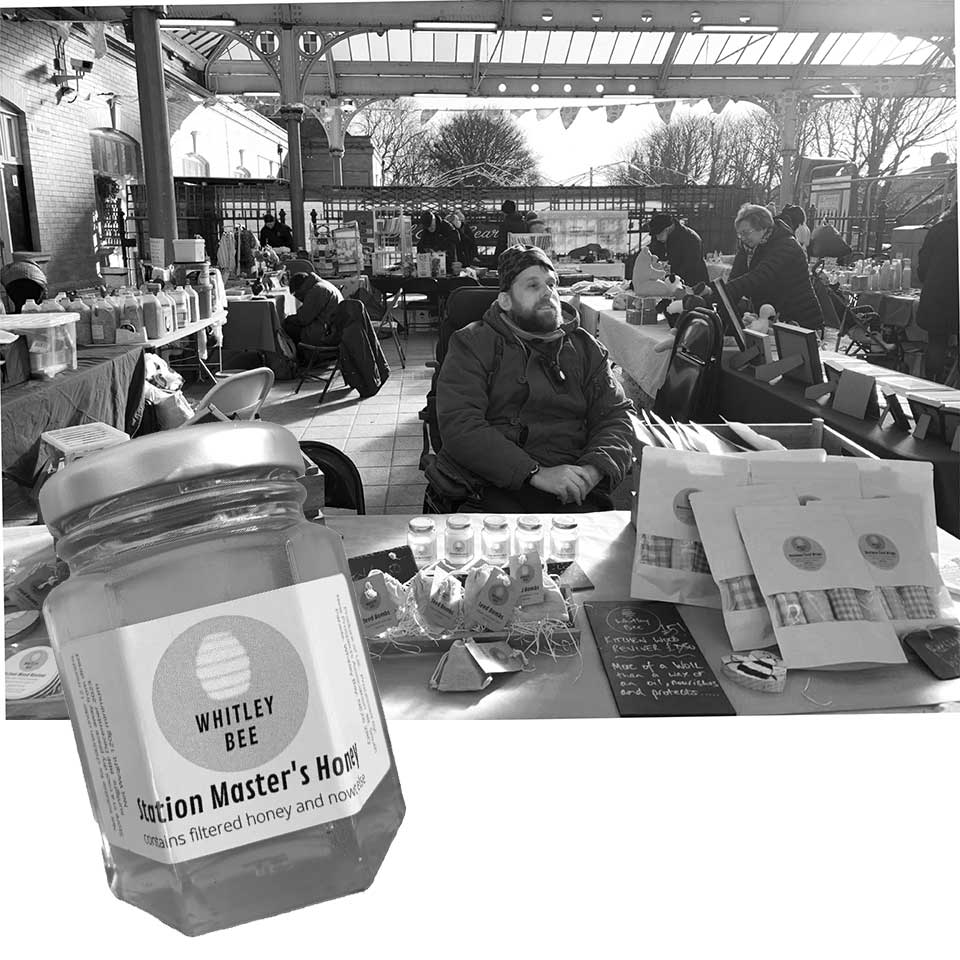As an increasingly grumpy Tim Keilty approaches his 50s, he is confident that he knows what good support is but is less sure about the plethora of models used to badge it.

Sweet something: does learning to make honey to sell at Green Beans Market require “person-centred, active support” or some YouTube videos?
Photo Tim Keilty
I am nearly 50. Yesterday I got a letter through the door for SunLife’s over-50s life insurance.
In my 20s, I wanted to change the world, in my 30s I would have settled for changing the system of social care, in my 40s, I attempted to see if I could change an organisation, here’s to my 50s…
Very disrespectfully during my 20s, two colleagues and I used to make gentle fun of a social worker (behind his back) who at the time was probably in his late 40s.
We used to call him the Fonz. He was a good social worker, probably brilliant, but had the audacity not to unthinkingly accept our new way, which at the time was person-centred planning.
He had the essence of what we were saying (or preaching) but did not use quite the same language, so he was not allowed on our team.
Now I am the Fonz. I am grumpy, unflinching and there’s no space in my head for new things. I hope the 20-year-olds now aren’t too harsh on me.
Anyway, recently, I’ve told a few stories about my work and people have been kind – but then tried to badge my story with their stamp.
Stubbornly alone
There’s a man I support who lives stubbornly and perilously alone in his bungalow, hates support and barely tolerates me.
As a good support worker, I’ve made it my business to know what’s going on and know people where he lives, I’ve rung the police about his dodgy neighbours and fostered relationships with the ones who look out for him. I’ve been in the shops with him and talked to shop workers.
In lockdown, he did not get cash as usual but vouchers for a supermarket. This meant he couldn’t go to the paper shop, which he does every day. The newsagent rang me, worried as they hadn’t seen him.
We now use his support money to pay his paper bill monthly. He is seen every day by someone who cares enough to make a phone call.
People respond to this story by saying: “That’s just like ABCD!”, “That’s ISFs” or “That’s just like my story of my support-community-centred-person-development-matrix-relational-model.”
Or is it just good support?
Full of beans
For ages at work, we’ve been trying to get involved with what’s going on in our town. We have tried to be nosy and helpful, not jump in with solutions but wait to find out what needs to be done and what people need help with.
The hope is that people we support can show or find their purpose and make their contribution.
Recently, we resurrected the Green Beans Market, a community market at our railway station, something that needed to be done.
At the market, we sold honey we had made after meeting a beekeeper at the community garden who loves keeping bees but doesn’t like the messy and time-consuming task of honey production.
Now people tell me: “That’s like the market-approach-to-making-community-centred-planning-happen”, “that’s adding social value”, “that’s local area coordination”, “that’s blah blah” etc.
They ask: “Which models and approaches did you use to support people to do the honey? Person-centred active support? Systematic instruction?”
We just watched YouTube videos.
What’s the difference?
So we are trying to do good support. I’m not dismissing any of the models and approaches – in fact I’d fight to the death to defend them.
But there is a danger we alienate people by badging models up when organising our conferences and sniping from our dugouts. There’s not a great deal between any of them.
My personal “model” is a distillation of all the stuff I’ve heard and read over the years, first summed up by advocates of inclusion John and Connie Lyle O’Brien, Jack Pearpoint and Lynda Khan: “Listen deeply, search for capacities, seek connections, be open to yes.”
The brilliant work of Simon Duffy is crudely summarised by me as: “Give people control of the money and let them crack on.”
And a great question from Richard Orr at Inclusion WA in Australia sums up what I try to do when figuring out how to support people: “How can we be most helpful in your life?”
I hope people won’t reply: ”That’s just like the questions/model/thinking in…”
I think Wolf Wolfensberger, the great theorist of disability policy and practice, said something like “there will never be a unified movement of devalued groups because they all devalue each other too much”.
As the Fonz would say: “Exactamundo.”
As I morph in to the Fonz, I’m worried that there’ll never be a unified way of changing the world because they all have a slightly better way to do it. n
Tim Keilty is special projects manager at New Prospects Association in the north east, a fellow of the Centre for Welfare Reform and of Citizen Network, and a paid supporter representative for Learning Disability England.





